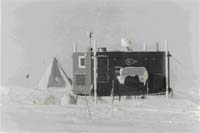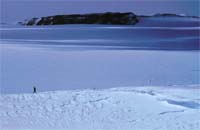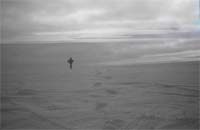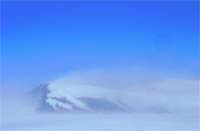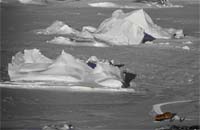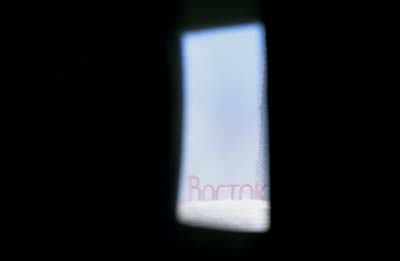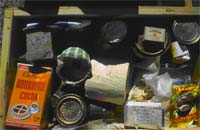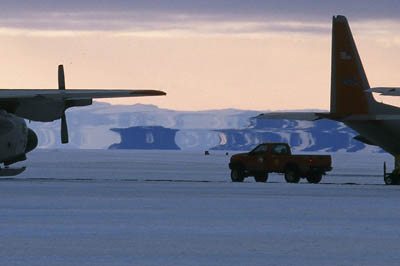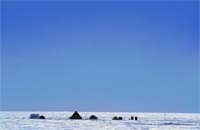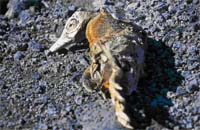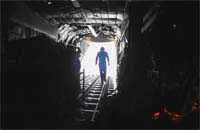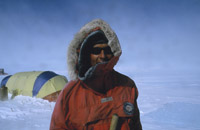Albedo: Fragments of Antarctic Time
first published by Impassio Press in In Pieces: An Anthology of Fragmentary Writing, 2006
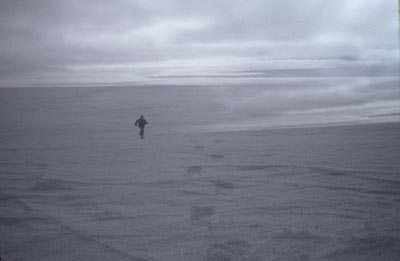
Aug. 10, 1994: I've begun final preparations for a voyage to the ice, my first Antarctic logistics. All travel requires the triage of departure, the lists of what-to-bring and what-to-leave-behind, but now I plan for a supposedly comfortable expedition to the world's most alien environment. Do I pack for work, for war, for vacation? Yes.
How to be a witness to an ice age: stand back, scratch your insulated head, fill a notebook with incomplete thoughts. Sketch the gap you hear.
Antarctica is the meditative white gate to all the darkness we cannot know. We don't understand this local quietus, much less the black universe beyond it, but here we go.
The past, the charismatic past, has been wiped clean by this bright absence. The world is white. This albedo that makes it impossible to name what it is I've arrived at has also made pale the places I've left behind. Snow-dressed ice extends to every horizon. Oblivion, I realize, is a great bright place. It is as shy of meaning as it is devoid of content.
"And how could one, here, speak of arrival or departure? Everywhere: oblivion, the unmade bed of absence, the wandering kingdom of dust."
—Edward Jabes, The Book of Questions
Here the snow is dust, small and hard. It shifts like sand. It makes a bed that constantly unmakes itself, a floor without wall or dimension. This snow is the white teeth of the wind, and the wind is the voice of this silent kingdom.
August: a brief truce while light speaks with time.
No birdsong, no horsefly buzz, no burp of frog, chatter of squirrel, no life talking at all. This place sings, though my ears have too much vocabulary to hear.
What We Import: Everything… Nothing was here before us, and nothing is here for us. We do not have the luxury of importing our own Nothing to this place. The United States, like the imperial powers that provisioned journeys to the afterworld at Giza and Xian, has intensely furnished a voyage down into this other world. We fill our ships and planes with Something, we make mock-ups of towns and domestic interiors out of every stitch, inch and ounce of it. We are simultaneously Potemkin, the Potemkin villagers, and the royalty willfully ignorant of the façade. We have great work to do.
Winter: no difference between night and day. Summer: no difference between day and night.
Sept., 1994: In these first Antarctic days, my thoughts tumble over each other as if in empathy with the storms outside my dorm window. I'm suddenly the sheltered confidant of an elemental world, witness to the vast wind furious with snow writing itself across the sea ice. Each surge of the gales is matched by the growing incandescence of the sun. Like the lit blossom of a dandelion, it emanates from the froth. Around it, night is luminous with the radiant tones of iris and forget-me-not.
I'm in Dorm 204, on the end closest to Winter Quarters Bay, and on the side that faces McMurdo Sound. The dorms are more or less lined up side by side, giving nearly every room a vista onto another bland brown dorm, but I'm one of a lucky few that have a clear view of how ice has given its quietus to both ocean and mountain. I've swiped a chair from the lounge and wedged it between the foot of my bed and the north wall, right in front of the window. I sit and watch spindrift seethe across the sea ice like spit across a red hot stove.
The weather right now is sometimes atrocious, often miserable, and always stunningly beautiful. During evenings spent alone (I'll have no roommate until October) in the shell of my room, I watch it all in happy disbelief. My dreamlife too is whirling out of control, with images of the world I left behind trying to find anchor in this frozen harbor. Each morning when I wake to my window, the brushstrokes of supernatural light paint me even farther out of the corner of my old expectations. After work on the worst days I sit and stare through the window for hours. The intense realness of what is happening here faces off against the equally real challenges to perception. The Transantarctic peaks seem 10 miles away, though it's more like 70. There are no smells here but those we bring. Our summer day will be four months long. Snow piles up under clear skies and sets like light cement.
The alien aesthetics dislodge me from what I thought I knew about life on Earth. Here is my Antarctic window, and it contains nothing of the immensity on the other side. I am contained by it, instead, just as much as I am held warm by these walls. Yet through this window I lose myself to this somehow intimate cold chaos.
Thinking myself into oblivion, happily. And taking notes.
Wind fills the white spaces with literal white noise. I imagine, then, that the ice I cannot see is a monument of wind built upon those sounds whose wavelengths are so great and so cold-shattered that we on the coast are awash in the fall of harsh fragments only.
No elbows of dark branches against this gossamer sky, no leaves to flutter slightly each time the wind unnerves them. No roots or grass to thread these thin clouds to this ice. No solace to exchange.
September is the month for strange skies: nacreous clouds and noctilucent clouds bring weird light to our indigo evenings. Both are at home only in the polar regions, and both only in the long twilight between winter and summer. Noctilucent clouds are over 50 miles high, so high that they're still lit by the sun long after it has set for us. They are bright well into an Antarctic twilight that has already altered our notion of what happens after darkness falls. Little else is known about them.
Nacreous clouds are iridescent and dense, silky and colored like mother-of-pearl: the hues are a muted neon, like oil-on-water but brilliantly backlit. Ten to fifteen miles high, they act as flamboyant catalysts for the atmospheric chemistry that depletes the southern ozone layer. Our eyes, stunned by the Antarctic world of ice, become useful again, rewarded with these rare and ephemeral sparks that speak to life, however distant.
Wind is the journey Antarctica makes into us. For us, working into it, wind is the Antarctic reality, the Antarctic curse. It cuts through layers of our insulation like a practiced knife. There are absurd moments when I try to fight back, trying to be a wind to the wind, trying to numb the numbness, or deny the freezing of flesh.
But to be a force without rest, without existence that senses, tries to know/intuit/guess, is not endurable. To be a force, yes, that's our goal, but recognize the frame: ours, perception, carved by wind. A wind-carved stone is called a ventifact. To work outside in Antarctica is to become a ventifact.
Antarctica, as the seismically quietest continent, rarely experiences earthquakes. The ice either suppresses actual motion or deadens the perception of it, or both. Knowing that the ice somehow binds the continent so tightly emphasizes my sense of Antarctica as a great simple place, the simplest on Earth.
Language grows cold. Here we find only unrooted grammar, mere fragments of speech, nothing much to be said. August and September give rise to lyrical syllables, before the declarative phrase of summer utters itself in earnest.
The ice influences the structure of my thoughts, enacts different forms of silence on how I say what I say.
"Words
fall like rocks at your feet
and stay there."
—Katha Pollitt, from "There," Antarctic Traveller
Now I know: white is blue. Antarctica is not white. Look closely at the snow at your feet, even more closely at the snow out beyond. Where I say white, think pale reflected greys and incremental blues. When you ask which blue, think bruise behind lace. When you think hue, think oblivion. All we see is surface. What we say is white, a cloud.
Jan., 1997: Fuel: Some of these McMurdo midsummer days are as dazzling to the eye as a prolonged bolt of lightning. My favorite time within them is tending the seven miles of fuel hose that snake from town toward the depot of aviation fuel at Willy Field. The hose is full of food for internal combustion, a lightning bolt buried in the cloud of the ice shelf. The sun-warmed hose melts a trench into the ice and is covered by a crust of drifting snow. We drive alongside the hose, hauling it back to the surface as we go.
My home away from home, a life of machines and controlled lightning under a gently slanting sun, dazzling and forlorn.
Lightning has never been documented in Antarctica, amazingly enough. The tall clouds required for electrical charge are never formed in this cold desert. Only the native summer albedo of all this snow and ice seems electric.
Each summer, I smuggle words from home to keep me company, to help make sense of this place. I've made expeditions into literature to lay claim to the language of cold open space. Reading Michaux, Gide, Kafka, Pessoa, Jabes, Simic, Celan, etc., I shamelessly lift lines and quotes, thoughts they planted in their own more temperate emptinesses. I will weld their words to this absence, conflate their texts with this white page. Much of it translated already from its original language, I translate it all once again into this unworldly context. I exile to the ice these already self-exiled writers, in order to derive a literature of Antarctica's own. In my imagination, at least, they thrive.
"You are the task. No pupil far and wide."
—Franz Kafka, The Blue Octavo Notebooks
I write to explain. A silence has blown through me. These words are flags shivering in that wind, but desire, constant desire to explain, is the battle to reach out to, and escape from, this silence.
Intimacy: People up north always ask about the isolation of my Antarctic work. It's difficult to convey to them that individual isolation is almost impossible to find down here, and that as a community we are extremely busy with the ways and means of American culture. I find conditions claustrophobic, crowded. It's something like ship-life, I think: all our space is shared. In McMurdo, we sleep at least two to a room, and we eat on the cafeteria's schedule.
Life in a field camp offers a taste of cultural isolation, as it mostly places us out of range of the TV and email of McMurdo. But field camp life usually means tighter quarters, more intense cooperation, and a therefore greater sense of enjoined humanity, island-making amidst the isolating (rather than isolated) landscape.
It's a function of talent and initiative to find quiet time in Antarctica. Where to hide, and how long can I hide there? Cook for myself with stolen vegetables in my room, read in a building or tent that isn't used (much) after dayshift, walk out to the horizon, or watch a blizzard sweep through town from the cab of an unused bulldozer.
Here I am, at play in the fields of the void.
The Substance Of Cold: Take away any idea of Antarctica you arrived with, and take away the ideas you conjured up in northern conversation; take away the rooms that keep you warm, and the machines that move you between them; take away the calm sunny days in midsummer and anything else that keeps you from shivering, nose-wiping, eye-drying, cheek-rubbing, earlobe-pinching, lip-stretching, and arm-swinging to drive blood back into the cold corners of your body. Remember when you're shoving your fingers into your armpits/pockets/crotch, or praying onto them with a cloud of breath, that you are having the only experience of Antarctica that matters on an ordinary windy day. This is the common dialogue between cold and the body.
No autumn, no turning of leaves, no apples to pick or winter squash to gather. No crows to punctuate the dying off of forests. No dying where there is no life. No mixed blessing for us to feel in the sudden flight of birds to warmer places. Instead, how little there is to see becomes stark: our eyes, trained to complexity, start to worry.
Albedo is the measure of how much radiating energy, i.e. sunlight, a surface reflects. Antarctica has the highest continental albedo on Earth. It reflects over 80% of all sunlight because it is so perfectly white. More importantly, the whiteness of the Antarctic absorbs so little energy that the sun cannot warm it. The ice remains ice, remains itself, due in large part to its albedo.
I have loosely translated this physical term for personal purposes because I am interested in Antarctica's capacity to give reflection to thought. For eight summers in the century of human activity on the ice, I have been busy with the idea that there is much more to say about Antarctica's play on the imagination.
As someone has said, every theory is an autobiography of the theorist, and this is the story of an "I" looking for a blank page. Not a new story, but on a new page, more blank than any other. Here the geography is so singular that our presence is inseparable from our desire to see: here we are the only figure on the figureless ground we study. This is the bright ground that obsesses me. Where else on Earth could I find such marvelous reflection?
This place is nothing if not an erasure.
South Pole: Where else can you feel exactly like a dab of paint on the Earth, a cold steel pin on a map of the Earth? Where else can you feel so well the fragments of space and time wash through you? This hollow wind is cold, racing in from nowhere and continuing on to nowhere, convincing you that you are between Nowheres, physically and philosophically, making you feel both beautiful and afraid, even after you trudge back to the heat behind walls.
It's hard to say whether being on the ice cap makes the Earth seem tiny or infinite or both. I'm looking right to the curvature of the planet in every direction, nothing but a texture of rough frosting to note the distance, and it strikes me that this sphere beneath me is little more than a tennis ball. On the other hand, if I were to walk the seven and a half miles to the far edge of the white yonder I can see, then perceive the next increment and walk it, and so on and so on until I starve and freeze, I'd know in my dying moments that my increments would scarcely mark a minor portion of this rough manifold earth.
To be standing here, or even at the cluttered Pole on this borderless plain, is to be stretched thin by the imagination's constant quest for place and context: I'm in visual possession of an entire round horizon, and that horizon is only a drop of ice in the sea of cold oblivion.
Desire creates absence. The more we want, the greater the absence becomes. Here in this nothing we want everything. Which is greater, our emptiness or the emptiness we see around us? The void we feel or the loneliness we fill it with? True absence is not ours, nor ours to fill. But we continue to interrogate silence.
To little avail: what ignores us saves us.
Memory And Antarctica: Memory always fails against the cold onslaught of time. Ice is time in Antarctica: time is both immoveable and unstoppable, like the ice cap. See the small stones memory places before the inevitable glacier, hear memory calling like an orphan through the abandoned ghetto of its thoughts.
Frozen wind falling on a graveyard of frozen wind.
Nov., 2001: Odell Glacier: On calm "nights" in our little amphitheater of ice, we have strange hours of Antarctic noise, gunshots and whispers from the ice itself. At bedtime the sun passes behind the spine of the Allan Hills, shadowing the camp for a few hours. During the passage of this shadow, the ice sheds its stored heat and begins to contract, crack. The firework pops and snaps that accompany the cracking can be heard underfoot, or under our sleeping bags, or from hundreds of meters away.
Some of them, though, force a dense susurrus of air from the ice which can last much longer than the crack itself. Like the whoosh in the instant a peal of thunder begins, their breathy sounds hurtle past us like bottle rockets. But they're much gentler, like whistling brushstrokes fishtailing into our ears. Like the echoes of a bullwhip, like ecstatic snakes of air, they are the sighs that follow the glacier's shiver.
There is nothing the color of blood in this country.
What intimacy is possible with this place? Not as much as I feel. How much loneliness do I find in the interior landscape? Not as much as I feared. The proximity of my life to this death, and the fact that my shadow is constructed by what objects I carry with me, contribute to the suspicion that I am scarcely here at all.
I am very much capable of joy, but I do not carry it with me. It is a craft, one I have to relearn every time.
At these latitudes, and when the only sign of life is human, joy is the easiest and hardest lesson to be learned.
The cold insisting itself into you like love, and never leaving.
"What being are you set on being?"
—Henri Michaux, Tent Posts
Difficult to answer in the Antarctic, because while the landscape opens me like a book, it provides nothing specific by which I can define myself. The land is foreign to us, and our work is alien within it.
Hard to belong, except wishfully, to the passion within the brief human history I am mostly passing through, balancing awe with a paycheck, a transient able only to propose a version of being that includes emptiness and transience.
"It was a most remarkable thing to witness a snow-petrel, small, light and fragile, making headway over the sea in the face of a seventy mile hurricane, fluttering down through the spindrift…"
—Douglas Mawson, Home Of The Blizzard
Dec. 15, 2001: As I plowed snow from the runway in a windy overcast post-blizzard day, I glanced up just as two snow petrels passed in front of me. Few things could be more surprising out here than the pulsing of wings.
Drifts have half-buried the runway and our camp in hardened snow. An enormous storm has reached all the way up from the coast to smother us. McMurdo has drifts several feet deep on its streets and airfield. We have to plow out what was our sparkling blue-ice landing zone.
And now through all this strange whiteness, beating upwind into the teeth of a blustery 30-knot wind, come even stranger fragments of albedo, 40 hard miles from the coast and food. I thought at first they were two chunks of snow uplifted by the machine and hurled by the wind, but no, they had wings, and were moving slowly up toward the ice cap instead of whipping end-for-end downglacier. Snow petrels are among the most beautiful of birds and seem like the perfect Antarctic totem. Pure white and graceful, they flutter over open water and the vast south polar pack ice for their food. Snow petrels tend to nest in the rocky outcrops and nunataks of Antarctica, sometimes more than 100 miles from the sea. Inland Antarctica, where no terrestrial life greater than lichen exists, is a hell of a place to nest.
In the time it took me to take the tractor out of gear, drop the bucket, and jump out onto the ice, a few seconds, they were gone. Focus came hard in the flat light under milky clouds, and it's harder still in such a light to find two creatures so camouflaged as to seem inanimate. The petrels might have been just upwind, flapping invisibly, or they may have veered well out of range. I actually looked down to see if they might be resting at my feet.
The brief experience was almost visionary, or at least unnerving. Did I really see two small pearl-white birds with rounded heads and oil-black beaks? Did I invent them to keep me company? What better gift, in a day full of hardness (hard snow on hard ice between hard stone ridges under a hard wind and light) to have flash before me these two soft creatures? Hard-nosed birds, no doubt, and supremely adapted, and a rare miracle to a tired eye.
The ice sheet returns my stare. Each of us a small peninsula into the other.
Dec. 26, 1957:
"Silence is now my bitterest enemy. Like a sorcerer in a magic hat, it stretches its cold hands through the porthole of my cabin and chokes me. It's an audible silence, a white river of time with a slippery bed. I wonder what the others feel?"
—Juhan Smuul, Antarctica Ahoy
Smuul waxes poetic and lonely in his first days near the continent. He hears silence, despite the steady noises of boat, plane and helicopter. This poetic silence is a fine example of either the power of imagination or the power of Antarctica to demand answers from the imagination.
It's quite common, especially in first experiences of the ice, to talk of an overpowering silence regardless of the noise we make. And I think this is an honest perspective. The silence comes not so much from an aural experience as from a visual one: we look out onto empty icescapes, find ourselves intuiting the silence that hovers right outside the portholes of our perception.
Penguins = Antarctica? Nonsense. Do we understand Australia by its surfers? The Great Lakes by the houses on their shores? Our bodies by the dirt under our nails?
The back-up beeper is the birdcall of McMurdo Station. A hundred forklifts, trucks, tracked vehicles, and bulldozers cry out to each other, giving warning, marking turf. How many untold thousands of these beeps are sung out daily?
McMurdo is a mechanical garden, a foreign grove amid the native clear-cut. And its birds sing out stridently "Watch out, watch out! We are moving backwards! Watch out!"
Here is the garden of absences.
The more I stare, the less I see. But I write more and more, to encircle with a thin dark line of fine print the absence that expands before my very eyes.
Albedo: I am a wick, these words my flame. The ice is our white wax. We are a pale candle in this light.
I write against the emptiness, the more to express it. I don't warm to my words as much as I study the space around them.
Memory And Antarctica: The things we say about the ice are mostly what inhabit the ice. The coast and the Convergence harbor exceptions, but as science knows, these are diffuse lines between poorly-defined regions. Like memory.
There are few borders between memory and imagination. There are even fewer to be found as we gape out across the borderless regions of Antarctica.
And what frame do we have for dividing the past, or for dividing the past from the present, while summer sleeps with its one eye open?
Albedo: Black may be the color of space, but white is the color of time. All colors sinter into one, or none, just as all moments annihilate, or fuse with, each other.
For some, Antarctica is the great white dove, a symbol of peace-geopolitical hope-and when the nomadic ground blizzards sweep over the nations of emptiness that form the continent, I can believe it.
"Get rid of words and meaning, and there is still poetry."
—Yang Wan-li, Heaven My Blanket, Earth My Pillow
Get rid of ice and stone, and is there still Antarctica? The land is writ on the consciousness of the few who have wandered it. I think that this is Yang Wan-li's poetry: the natural rhythms of nature in the mind.
Without the ice, is it still Antarctica? Lord knows, but the species who named it will not be around to think about it. The window onto existence given to humans will surely end before the ice slides off the continent, or the continent slides out of the polar region.
Without poetry, is it still Antarctica? This is harder to answer. While each has little to do with the other, words and meaning are similarly detached from both.
You could show a movie on this storm. No soundtrack, no tune, just the static and howl of the whirling reels, the slapping of the brittle film-end against your face.
Albedo: Memory And Antarctica: Now that I'm preparing to leave, the Antarctica of the imagination includes the memory of myself within it, and this is both the best and worst tool I have for mapping such emptiness. The memory of the self in a place is what gives that place boundaries; this is how we make a garden (in the mind) of a wilderness. The vast openness of the Antarctic challenges this mental operation, however, and makes it clear how our claim to familiarity can be a pretense.
The landscape of the mind I've inherited from my experiences projects small dark figures against the white backdrop. They are features that cannot take root; I imagine them (me) always moving, never part of the land, like the snowmobile at AGO 1 racing back and forth to briefly tame the white surface.
The albedo of Antarctica also deflects our image and our efforts.
However intense our time on the ice may be for us, it is not a transfigured land we are leaving. The ice is unchanged. Our memories root themselves deeply within us but cannot find traction on the ice. We are mapping ourselves onto the ice as much as we are mapping the surface for our use. The fact that nearly everyone who has left the ice is haunted by their memories of it shows how impossible it is to conclude the mapping. Like the topographic maps which draw a helpless line in the shifting sands of the ice cap, at their "limit of observation," the visitor to the Antarctic fails to bring the strangeness within comprehension. We leave behind the journeying part of ourselves, unfinished and in awe.
"A tranquil country, sealed away."
—Andre Gide, Amyntas
Sealed away inside me, Antarctica travels around my mind like a lake through a turbulent river. My thoughts run to it as if to a country I long for but cannot find. Tranquility amid anxiety, and from now onward we are traveling companions.
|
© Copyright Jason Anthony All rights reserved. |

